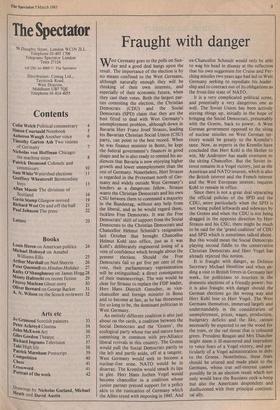Fraught with danger
est Germany goes to the polls on Sun- day and a good deal hangs upon the result. The importance of the election is by no means confined to the West Germans, although naturally enough they will be thinking of their own interests, and especially of their economic future, when they cast their votes. Both the largest par- ties contesting the election, the Christian Democrats (CDU) and the Social Democrats (SPD) claim that they are the best fitted to deal with West Germany's unemployment problem, although down in Bavaria Herr Franz Josef Strauss, leading his Bavarian Christian Social Union (CSU) party, can point to the best record. When he was finance minister in Bonn, he kept the federal government's finances in good shape and he is also ready to remind his au- diences that Bavaria is now enjoying higher growth and lower unemployment than the rest of Germany. Nonetheless, Herr Strauss is regarded in the Protestant north of Ger- many and widely outside West Germany's borders as a dangerous fellow. Strauss wants the Christian Democrats and his own CSU between them to command a majority in the Bundestag, without any help from the liberal, and as he would regard them, feckless Free Democrats. It was the Free Democrats' shift of support from the Social Democrats to the Christian Democrats and Chancellor Helmut Schmidt's resignation last October that brought Chancellor Helmut Kohl into office, just as it was Kohl's deliberately engineered losing of a vote of confidence which brought about the present election. Should the Free Democrats fail to get five per cent of the vote, their parliamentary representation will be extinguished; a direct consequence of their manoeuvrings. The way would be clear for Strauss to replace the FDP leader, Herr Hans Dietrich Genscher, as vice- chancellor and foreign minister in Bonn and to become at last, as he has threatened for so long to be, the dominant politician in West Germany. An entirely different coalition is also just about on the cards, a coalition between the Social Democrats and the 'Greens', the ecological party whose rise and nature have something in common with pre-Alliance liberal revivals in this country. The Greens would pull the Social Democrats partly to the left and partly aside, off at a tangent. West Germany would seek to become a nuclear-free zone. NATO would be in disarray. The Kremlin would smack its lips in glee. Herr Hans Jochen Vogel would become chancellor in a coalition whose junior partner pressed support for a policy akin to the rustication of Germany which the Allies toyed with imposing in 1945. And ex-Chancellor Schmidt would only be able to wag his head in dismay at the reflection that his own suggestion for Cruise and Per- shing missiles two years ago had led to West Germany seeking to repudiate his leader- ship and to contract out of its obligations as the front-line state of NATO.
It is a very complicated political scene, and potentially a very dangerous one as well. The Soviet Union has been actively stirring things up, initially in the hope of bringing the Social Democrats, presumably with the Greens, back to power. A West German government opposed to the siting of nuclear missiles on West German ter- ritory would be greatly to the Kremlin's taste. Now, as experts in the Kremlin have concluded that Herr Kohl is the likelier to win, Mr Andropov has made overtures to the sitting Chancellor. But the Soviet in- terest remains in a Vogel victory, just as the American and NATO interest, which is also the British interest and the French interest and the West European interest, requires Kohl to remain in office.
Since there is not a great deal separating the official policies of the SPD and the CDU, more particularly when the SPD is not being pulled leftwards and sideways by the Greens and when the CDU is not being dragged in the opposite direction by Herr Strauss and his CSU, there might be much to be said for the 'grand coalition' of CDU and SPD which is sometimes talked about. But this would mean the Social Democrats playing second fiddle to the conservative Christian Democrats and Herr Vogel has already rejected this notion.
It is fraught with danger, as Defence Secretary Michael Heseltine said when en- ding a visit to British forces in Germany last week, for politicians to interfere in the domestic elections of a friendly power; but it is also fraught with danger should the German elections go the wrong way and Herr Kohl lose to Herr Vogel. The West Germans themselves, immersed largely and understandably in the consideration of unemployment, prices, wages, production, budgetary deficits and the like, cannot necessarily be expected to see the wood for the trees, or the red threat that is coloured green. President Reagan and Mrs Thatcher might deem it ill-mannered and imprudent to voice fears of a Vogel victory, and par- ticularly of a Vogel administration in debt to the Greens. Nonetheless, these fears should be uttered and made plain to the Germans, whose true self-interest cannot possibly lie in an election result which not only would have the Russians cock-a-hoop but also the Americans despondent and disillusioned with their principal continen- tal ally.














































 Previous page
Previous page